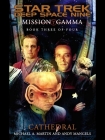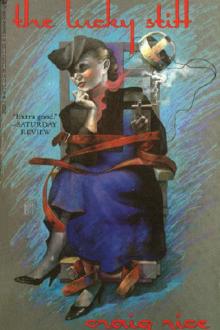Cathedral by Michael Mangels (best romance novels of all time .TXT) 📗

- Author: Michael Mangels
Book online «Cathedral by Michael Mangels (best romance novels of all time .TXT) 📗». Author Michael Mangels
“Exoscalpel,” he said.
Krissten handed him the instrument. “Sir?” she said.
He paused in his labors for only a moment. “Yes?”
“It’s good to have you back.”
26
Two hundred and fourteen, Joseph Sisko thought, updating his tally as he carefully made his way down the antebellum mansion’s polished hardwood staircase. One-hundred and twenty-three.
Keeping track of the numbers had become a daily ritual, one that Joseph observed every morning as soon as he realized he was awake. He had become religious about it from the beginning; it had given him something to focus on other than the procession of new aches and ailments that each new day brought. No matter that carrying the ever-increasing weight of those days threatened to crush his frail bones. He had to count the days, dragging them with him wherever he went.
Two hundred and fourteen. One hundred and twenty-three. The first figure represented the number of days that had elapsed since his only son, Benjamin Lafayette Sisko, had disappeared into that damned alien hellhole near Bajor.
The second marked the span of days since Benjamin’s only son—Joseph’s beloved grandson, Jake—had gone into the wormhole after his father, only to be swallowed up without a trace as well.
Passing through the broad atrium and into the kitchen, Joseph contemplated the sunlight that streamed in through the French windows, and yet brought him no joy. The August day—was it August already?—was already shaping up to be hot and muggy, but would surely be easier to face after he’d had his morning cup of coffee. He glanced up at the old-fashioned analog clock hanging above the range. Twelve fifty-five.
Afternoon coffee, then. He shrugged, then set about grinding the beans, ignoring the cold, persistent ache in his fingers, his neck, his shoulders. His soul. Morning. Noon. Night. What was the damned difference?
He paused as the water boiled and the coffee brewed, looking around the kitchen. Nothing of any consequence had changed here in years. On the far wall, above the sink, hung a framed photograph of the façade of his restaurant. The building that housed Sisko’s Creole Kitchen for the past quarter-century had been a landmark in New Orleans’ French Quarter for more than two hundred years. For Joseph, working in his kitchen among his loyal staff—serving a daily procession of new and regular customers—had always provided refuge from life’s troubles. During later years, marked by heart trouble and too-frequent entreaties from employees, friends, and customers that he slow down, he found in the charming old building a comforting reminder of easier times, when Judith and Ben were still children. In those days, he’d never heard of shape-shifters or the Dominion, and never had cause to consider the casual damage that Starfleet could inflict on ordinary people who were just trying to make lives for themselves.
I raised you to be a chef, Ben. For all the good it did me.
On the shelf beside the sink lay an upended plastic bottle, its cap askew. The heart medicine. Joseph had been planning on getting the prescription refilled for the better part of a week now, but it hadn’t seemed all that urgent. Somewhere in the back of his brain, he heard Ben’s voice rising in wrath: Damn it, Dad! Ask somebody on your staff to help you. Can’t you cooperate just one time?
The glare from the early-afternoon sun revealed the thickening patina of dust that covered the picture’s glass frame. He reached up to touch Ben’s inscription of one of Joseph’s own favorite aphorisms: “Worry and doubt are the greatest enemies of a great chef.” His finger came away streaked with a paste of old dirt and cooking grease. Searching his memories, he found he couldn’t recall the last time he’d given this place a really good cleaning. Perhaps this, too, simply didn’t matter all that much anymore.
A few minutes later, Joseph stood before the kitchen sink, holding a mug of hot, strong coffee in his hand. The hand trembled sharply, and a copious splash of near-boiling liquid forced him to place the cup on the counter. Cursing, he plunged his scalded hand beneath a stream of cold water—and glimpsed his own reflection in one of the metal pans he’d left on the drying rack.
He shut the water off, staring at the gaunt image he’d been trying so hard to avoid seeing in the bathroom mirror over the past few months. He wondered when exactly he had decided to stop shaving, but couldn’t recall. And when had his hair gone so completely white?
Joseph lifted the pan and stuffed it haphazardly into one of the kitchen’s lower cabinets. The motion seemed to have displaced several other objects located farther back on the shelf; he ignored the sounds of tumbling crockery.
The house stood silent again, except for the thready beat of his own heart and the hum of the wall clock that tirelessly measured out his remaining hours and days.
Was I supposed to do something today? He picked up his coffee, more carefully this time, and considered the coming evening without any real enthusiasm. The dinner crowd would arrive tonight, just as it always had, first in dribs and drabs, and later in waves. It would be just another night, indistinguishable from the years of nights on either side of it.
Enough of this. He set his half-full cup aside and pulled his thin cotton robe tightly around his narrow frame. Opening the blinds above the kitchen sink, he looked out into the vegetable garden. The sight immediately jogged his memory, bringing the day’s agenda to the front of his thoughts. Walking to the back door, he slipped his feet into the work boots he’d left on the mat. Grabbing the gardening gloves from the peg beside the door, he ventured outside.
Jays and yellowhammers sang through the green canopy of longleaf pines and cypresses as Joseph deliberately





Comments (0)